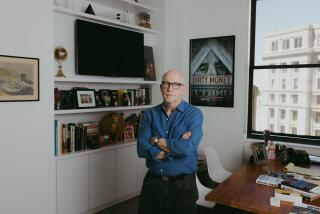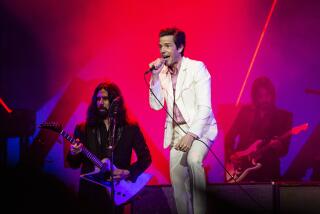Paul Simon & Co.: From ‘Graceland’ to Gorky Park
- Share via
MOSCOW — After Paul Simon finished his first-ever concert in the Soviet Union, a young Soviet painter managed to get a gift and a fan letter delivered to the performer backstage.
The note, written in English and taped to the back of an impressionistic landscape painting, welcomed Simon to the Soviet Union.
“My friends and I know well your music for 70 years,” the painter wrote.
“Well, he may have gotten carried away with the 70 years part,” Simon, 47, said with a laugh Sunday. “But it’s still a nice gesture.”
The gift is a sign of how well Simon thinks his rhythmic South African-style music has been received here.
Simon’s “Graceland” performance Saturday night in an open-air auditorium in Gorky Park on the banks of the Moscow River drew many in the audience of about 5,000 to their feet.
Most remained standing throughout the entire two-hour performance, including dozens who crowded around the stage during the concert.
Simon, wearing blue jeans and a T-shirt, greeted the crowd in Russian.
“We’re glad to be in Moscow,” he said.
The musicians included the 10-man Zulu choir Ladysmith Black Mambazo and two South African exiles: singer Miriam Makeba and trumpeter Hugh Masekela.
It was a rare performance by black South African musicians in the Soviet Union, which does not have diplomatic relations with South Africa.
The show is based on Simon’s Grammy Award-winning record “Graceland,” a fusion of American pop and black South African music. The concert included “Free Nelson Mandela” and other songs of black national liberation, some sung in the Zulu language. Simon also sang the old Simon & Garfunkel hit “The Sounds of Silence.”
“Everybody was pumped up for the show. And I felt instinctually that in terms of audience reaction, it was an exceptional concert,” Simon said in his suite in the Rossiya Hotel overlooking Red Square.
Twenty years ago, Simon and then-partner Art Garfunkel were known here mainly through underground sales of secondhand albums or bootlegged recordings.
But under Soviet President Mikhail S. Gorbachev, the recordings of Simon and scores of other pop musicians have increasingly become available.
Simon said nevertheless he sensed that many people in the Soviet Union knew of Simon & Garfunkel, not Simon as a solo performer, and for that reason he had not been sure how “Graceland” would be received.
But before the concert was over, Simon even got a smile from one of the stony-faced militiamen standing backstage to block entrance to the area, he said.
“They never left their posts and they did not watch the concert,” Simon said of the militiamen. “But near the end, when I approached one to see if I was pronouncing ‘good night’ correctly in Russian, I got a big smile.”
Contact with average Soviet citizens has not been easy during his visit to the Soviet Union, which began with two days of sightseeing in Leningrad.
Many in the audience at Saturday night’s performance were foreigners and after the show Simon went to a party in the courtyard of a building where foreigners live.
But Simon said he had some impressions about the country, including the sense that younger Soviets were more open and hopeful, while the older generation appeared distrustful. He also noted many people appeared to be poor.
“I’d like to come back to the Soviet Union again, but not to the cities,” he said. “I’d like to see the countryside, the little towns, the ocean.”
Simon said the band was losing money on its two Moscow performances, primarily because the musicians are paid in rubles, which cannot be taken out of the Soviet Union, and there is little in the country to buy with the money.
But he said the difference is being made up on the rest of the tour, which began in Brussels on June 15 and is to conclude July 9 in Barcelona, Spain.
“Besides, this tour was really not about money,” he said. “It was about bringing our music to Russia. Falling in love with someone’s music leads to greater identification and sympathy for the people playing that music.”
More to Read
The biggest entertainment stories
Get our big stories about Hollywood, film, television, music, arts, culture and more right in your inbox as soon as they publish.
You may occasionally receive promotional content from the Los Angeles Times.










